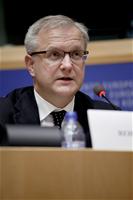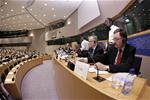MEPs want the Commission to manage EU's economic governance
Ralitsa Kovacheva, July 8, 2010
 The European Commission must be the "strong hand" in the economic governance of the Union. This position has been expressed by a majority of MEPs in a debate with Commission's President Jose Manuel Barroso in Strasbourg. He outlined the Commission's latest plans for European economic governance:
The European Commission must be the "strong hand" in the economic governance of the Union. This position has been expressed by a majority of MEPs in a debate with Commission's President Jose Manuel Barroso in Strasbourg. He outlined the Commission's latest plans for European economic governance:
"We need a refined incentives and sanctions tool-box. Without this, we will not be able to enforce economic governance effectively. And the sanctions must be quasi-automatic"
MEPs openly accused Member States that they were not sufficiently active in terms of economic governance. The Parliament has been criticizing the countries for months for being persistent in their manner to address the problems on an intergovernmental, rather than Community level. And that Member States refuse to delegate more rights to the European institutions, especially in terms of economic governance and financial regulation. In this respect, one of the most critical MEPs has always been the leader of the ALDE (Alliance of Liberals and Democrats for Europe)Group Guy Verhofstadt:
"The main question is - who is going to be responsible for managing economic governance? Will it be the Council? The Member States? Or an EU body? For the European Parliament it is clear: it must be an EU body. The Member States were never able to supervise themselves, and they will not in the future."
Mr Verhofstadt also called for sanctions to be part not only of the Stability and Growth Pact but also of other areas, for instance the EU 2020 strategy for smart, sustainable and inclusive growth.
The S&D group criticized the Commission's proposal for a lack of balance and a  focus on sanctions. The Socialists and Democrats emphasized on the need for more "social fairness" and suggested a shift in taxation, saying "Taxation on labour is far too high in many Member States." The Greens/EFA (European Free Alliance) Group shared a similar position: “We cannot have tax havens; there cannot be companies that are not taxed", MEP Sven Giegold (DE) said.
focus on sanctions. The Socialists and Democrats emphasized on the need for more "social fairness" and suggested a shift in taxation, saying "Taxation on labour is far too high in many Member States." The Greens/EFA (European Free Alliance) Group shared a similar position: “We cannot have tax havens; there cannot be companies that are not taxed", MEP Sven Giegold (DE) said.
 In an attempt to win MEPs' support for the Commission's proposals on economic governance, European Commissioner for Economic and Monetary Affairs Olli Rehn was also in Strasbourg. Speaking before the Parliamentary Economic Committee, he presented the main aspects of the proposal. An immediate priority, according to Olli Rehn, is to make the European Financial Stability Facility operational. This is quite a sensitive issue for MEPs who have openly protested for not being consulted before the Commission and Council had decided to establish it.
In an attempt to win MEPs' support for the Commission's proposals on economic governance, European Commissioner for Economic and Monetary Affairs Olli Rehn was also in Strasbourg. Speaking before the Parliamentary Economic Committee, he presented the main aspects of the proposal. An immediate priority, according to Olli Rehn, is to make the European Financial Stability Facility operational. This is quite a sensitive issue for MEPs who have openly protested for not being consulted before the Commission and Council had decided to establish it.
Referring to the urgent problems in the Union and especially in the eurozone, the Commissioner quoted the former President of the Commission Jacques Delors, as saying that fire-fighters have done their job, now we are waiting for the architects. “I do agree with Delors – but only in half! In other words: yes, we need architects to reform the EU's economic governance – but we also need to maintain vigilance in fire-fighting, since we are certainly not out of the woods yet”, Rehn commented. He assured lawmakers that at the next Council of Finance Ministers (13 July) the ministers of finance would approve the first so-called "European semester" to start from 2011.
With regard to another topic, important to MEPs - the introduction of bank levies, the Commissioner criticized the failure of the G20 to come up with a common position on the issue: “The G20 left to each member the decision to apply a levy or not. This obviously fell short of our objectives. However, the G20 could at least agree on a common set of principles on a levy on financial institutions. In the EU, we need to complete our own reform of the financial supervisory architecture as soon as possible.”
In this context, Commissioner Rehn reiterated the importance of  publishing the bank stress-test results (by mid-July). This is particularly important in the context of restoring confidence, a key argument in the speech of the Commissioner before the MEPs. They, in turn, in an expression of good will a compromise with Member States to be reached on some of the most controversial issues, rather than vote the new European framework for financial supervision, adopted a resolution urging the Commission to submit by the end of the year one or more draft laws related to the management of cross-border crises in the banking sector.
publishing the bank stress-test results (by mid-July). This is particularly important in the context of restoring confidence, a key argument in the speech of the Commissioner before the MEPs. They, in turn, in an expression of good will a compromise with Member States to be reached on some of the most controversial issues, rather than vote the new European framework for financial supervision, adopted a resolution urging the Commission to submit by the end of the year one or more draft laws related to the management of cross-border crises in the banking sector.
MEPs' proposals repeat those of the parliamentary economic committee last month, as euinside has already written - an EU resolution and insolvency regime to be established, considerable coordination powers to be vested in the nascent European Banking Authority (EBA) and an EU financial stability fund to be established “to preserve banking stability in difficult times, and also a resolution unit within the EBA in charge of restructuring cross-border systemic banks which run into difficulties”.
Michel Barnier, European Commissioner in charge of financial services, welcomed the Parliament's proposals as a "very credible toolbox" and assured MEPs that the Commission would reflect these proposals in the consultation paper it is to launch in October as well as in the legislation to be submitted next year.
 Discussions on economic and financial regulation made the serious differences between EU institutions and Member States evident on some of the most important issues. Despite the general support expressed by European leaders at the June Council , there still are many “small stones”, which could "turn the car of common economic governance upside down". Because the truth is that Brussels has never before wanted so much power that Member States are clearly not ready to concede. And unlike many, especially in Bulgaria, I do not think that this is a battle between the Eurocrats and national governments and interests but rather the only way for everyone to move in one direction, albeit with varying pace.
Discussions on economic and financial regulation made the serious differences between EU institutions and Member States evident on some of the most important issues. Despite the general support expressed by European leaders at the June Council , there still are many “small stones”, which could "turn the car of common economic governance upside down". Because the truth is that Brussels has never before wanted so much power that Member States are clearly not ready to concede. And unlike many, especially in Bulgaria, I do not think that this is a battle between the Eurocrats and national governments and interests but rather the only way for everyone to move in one direction, albeit with varying pace.